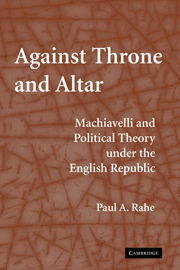Book contents
- Frontmatter
- Contents
- Acknowledgments
- Abbreviations and Brief Titles
- Introduction
- Prologue: Machiavelli in the English Revolution
- PART I MACHIAVELLI'S NEW REPUBLICANISM
- PART II REVOLUTIONARY ARISTOTELIANISM
- PART III MACHIAVELLIAN REPUBLICANISM ANGLICIZED
- PART IV THOMAS HOBBES AND THE NEW REPUBLICANISM
- 8 Thomas Hobbes's Republican Youth
- 9 The Making of a Modern Monarchist
- 10 The Very Model of a Modern Moralist
- 11 The Hobbesian Republicanism of James Harrington
- Epilogue
- Index
10 - The Very Model of a Modern Moralist
Published online by Cambridge University Press: 21 July 2009
- Frontmatter
- Contents
- Acknowledgments
- Abbreviations and Brief Titles
- Introduction
- Prologue: Machiavelli in the English Revolution
- PART I MACHIAVELLI'S NEW REPUBLICANISM
- PART II REVOLUTIONARY ARISTOTELIANISM
- PART III MACHIAVELLIAN REPUBLICANISM ANGLICIZED
- PART IV THOMAS HOBBES AND THE NEW REPUBLICANISM
- 8 Thomas Hobbes's Republican Youth
- 9 The Making of a Modern Monarchist
- 10 The Very Model of a Modern Moralist
- 11 The Hobbesian Republicanism of James Harrington
- Epilogue
- Index
Summary
We do not know when Thomas Hobbes first read De rerum natura. For understandable reasons, the authorities who designed the curricula for England's grammar schools and for the University of Oxford chose not to include on either syllabus a poem quite rightly regarded as a fount of atheism, and in his various autobiographical works, Hobbes is silent on the subject. In consequence, Lucretius is rarely mentioned in the secondary literature on Hobbes's political thought – although there is evidence that his influence on the Malmesbury philosopher was considerable. He was, after all, one of the handful of authors whom Hobbes himself actually deigned to mention. Moreover, the English philosopher's physics, as he readily acknowledged, owed a great deal to the Epicurean account espoused by the Roman poet, and the charge that he was an Epicurean was frequently leveled against Hobbes by contemporary critics. By the eighteenth century, one could, in fact, speak of “an epicurean or a Hobbist” as if there was no difference, and no less an authority than David Hume did so.
It is tolerably likely that Hobbes read De rerum natura on the sly during his years at Magdalen Hall. He arrived at Oxford in the wake of an Aristotelian revival, and in his day the university statutes not only specified that students study with extreme care the works of Aristotle dealing with physics, metaphysics, psychology, rhetoric, morals, and politics.
- Type
- Chapter
- Information
- Against Throne and AltarMachiavelli and Political Theory Under the English Republic, pp. 291 - 320Publisher: Cambridge University PressPrint publication year: 2008

